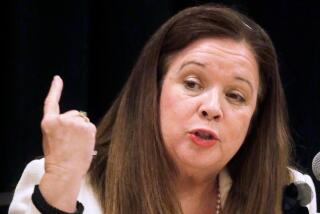Ethics Unit Assails Meese, Cites Aid He Gave Wallach
- Share via
WASHINGTON — The Administration’s ethics watchdog agency Monday accused former Atty. Gen. Edwin Meese III of undermining the public’s confidence in the integrity of government by allowing his name and office to be used by his longtime friend, E. Robert Wallach, and by his handling of his taxes and financial disclosure reports.
In a hard-hitting memorandum from an agency not known for strong public statements, the Office of Government Ethics said of Meese: “Simply avoiding criminal conduct is not the mark of public service.”
Frank Q. Nebeker, the ethics office director, indicated that Meese is no longer subject to any administrative sanctions by his office. The office is charged with reviewing the ethical conduct of executive branch officials, but Meese stepped down last month.
Nonetheless, the report might be “of particular interest to those about to form a new administration,” he said.
Nebeker said he “strongly believed” that problems such as Meese’s “are not widespread in the executive branch and that the vast majority of officers and employees are hard-working and loyal individuals who make every effort to adhere to the high ethical standards the public has a right to expect . . . .”
Meese, who is a senior fellow at the Heritage Foundation, a conservative think tank, was in London Monday attending an international meeting of police officials and could not be reached. His lawyer, James E. Rocap III, said that Nebeker had unfairly impugned Meese’s integrity and reputation and had rejected the lawyer’s request to meet with him to hear Meese’s side.
Wallach’s office in San Francisco said that he was not available for comment on the report.
Decided Against Prosecution
Meese stepped down last month after independent counsel James C. McKay concluded that he had “probably” committed four violations of federal conflict-of-interest and tax laws while serving as attorney general but decided not to prosecute. Meese and his lawyers sharply disputed McKay’s criticism and conclusion.
One more investigation of Meese is pending. That inquiry, by the Justice Department’s counsel for professional responsibility, is not expected to be completed before next month. The counsel has the authority to issue a censure.
In his 17-page memorandum to government ethics officers, general counsels and other interested parties, Nebeker said that the “most troublesome aspect” of the information unearthed by McKay “is the extent to which Mr. Meese or Mr. Meese’s official position was used for the benefit of Mr. Wallach. The standard against using public office for private gain includes the private gain of others, not simply the personal gain of the employee.”
Assisting a Friend
The memo noted that “assisting a friend is not in and of itself prohibited” by the 1965 executive order that has become the foundation for ethical standards.
“But assisting a friend in a manner which misuses official position for the friend’s private benefit, which gives that friend preferential treatment not properly afforded, which causes a government decision to be made outside official channels, which affects the public’s confidence in the integrity of its government . . . “ does contravene the order’s basic intention, the memo said.
Facing Trial in Wedtech Case
Wallach, a former law school classmate of Meese, is facing trial in New York next January on charges of defrauding the scandal-plagued Wedtech Corp. He is accused of attempting to influence Meese to help the now-defunct New York defense contractor get government business.
Nebeker said also that Meese had not complied with an agreement he had made with the ethics office not to take any official action involving Wallach while still owing him legal fees. Wallach represented Meese during an earlier independent counsel’s investigation of Meese.
Iraqi Pipeline Project
Nebeker said that Meese in mid-1985 called Robert C. McFarlane, then President Reagan’s national security adviser, on Wallach’s behalf in connection with a proposed $1-billion Iraqi pipeline project that Wallach had been hired to represent.
“This office did not accept Mr. Meese’s ethics agreement lightly, does not accept his failure to comply with it lightly and will not accept another nominee’s agreements lightly in the future,” Nebeker said.
“These agreements serve an important purpose not only for the individual involved but for the public,” the memo said. “This investigation of Mr. Meese is a stark example of the results of inattention to such an agreement by an official.”
Failed to Sell Stock
In addition, the memorandum criticized Meese for failing to fulfill a promise to divest himself and his wife of stock they held in the so-called Baby Bell telephone companies, a situation that raised a potential conflict of interest because of a federal antitrust case involving the firms.
“This lack of genuine concern for honoring the terms of the agreement he made with this office was an important factor that led to the expanded investigation by Mr. McKay,” the memo said.
“The agreement was as much for his benefit as it was for the (Justice) departmental processes and the public, and the simple fact that he chose not to live up to its terms, for whatever reason, has led to this unfortunate and expensive result,” Nebeker said.
More to Read
Get the L.A. Times Politics newsletter
Deeply reported insights into legislation, politics and policy from Sacramento, Washington and beyond. In your inbox twice per week.
You may occasionally receive promotional content from the Los Angeles Times.










